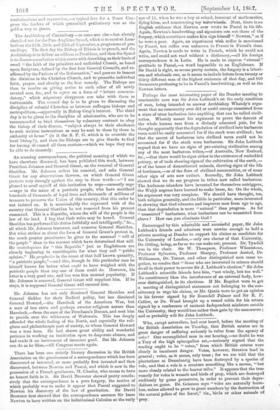Perhaps the most interesting paper of the Dundee meeting to
unscientific men was Sir John Lubbock's on the early condition of man, being intended to answer Archbishop Whately's argu- ment that no community ever did or could emerge unassisted from a state of utter barbarism into anything that can. be called civili- zation. Whately meant his argument to prove the descent of the whole human race from a divinely educated pair, for he thought apparently that the degradation of civilized into barbarous races could be easily accounted for if the stock were civilized ; but that the ascent of barbarous into civilized races could not be accounted for if the stock were barbarous. Sir John Lubbock argued that we have no signs of pre-existing civilization among any of the most barbarous tribes,—of Australia, New Zealand, &c., —that there would be signs either in the existence of embedded pottery, or of tools showing signs of the cultivation of the earth,— or of the bones of domesticated animals, showing signs of the life of herdsmen,—or of the flora of civilized communities, or of some other sign of arts now extinct. Secondly, Sir John Lubbock showed that we do see progress in tribes now called barbarous. The Andaman islanders have invented for themselves outriggers, the Wajiji negroes have learned to make brass, &c. On the whole, his argument was very complete. We should have thought, too, both religion generally, and the Bible in partiCular, more interested in showing that God educates and improves men from age to age, than that degradation is more " natural " than progress. As for " unassisted" barbarians, what barbarians can be unassisted from above ? How can you eliminate God ?






























 Previous page
Previous page